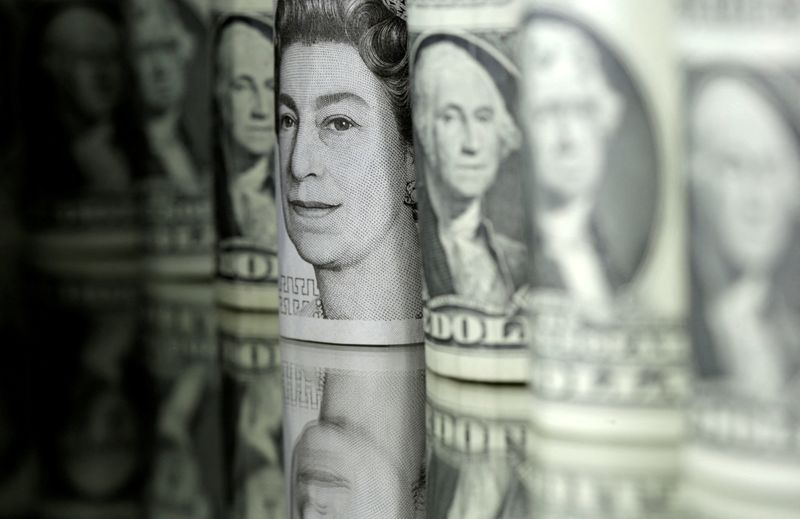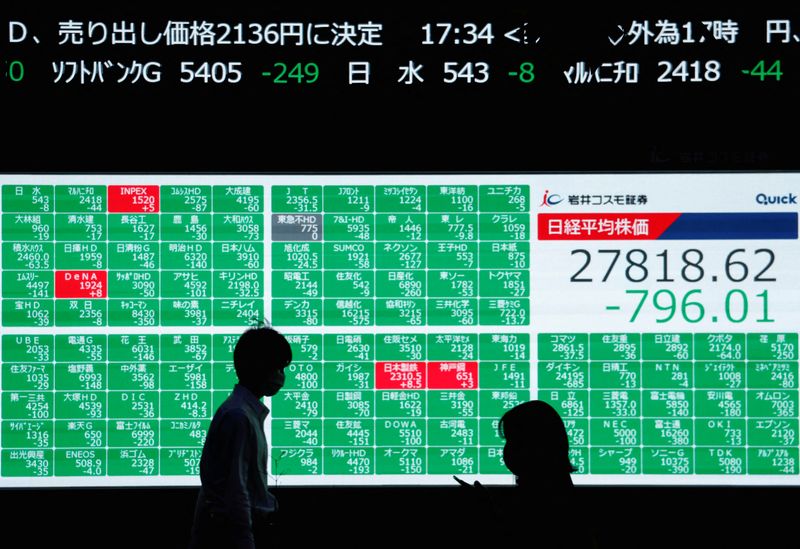By Herbert Lash and Marc Jones
NEW YORK/LONDON (Reuters) - The dollar rose and equity markets slid on Thursday after hawkish remarks from a Federal Reserve official that reminded investors a less aggressive monetary policy is unlikely with U.S. employment data still showing a tight labor market.
Nagging recession and higher interest rate worries also rattled European markets, while the pound tumbled as Britain hoped to put its disastrous recent fiscal experiment behind it with a more austere-looking budget.
Early optimism in Europe about Siemens ' (DE:SIEGn) earnings and that the European Central Bank might slow its rate hikes soon waned and markets fell. More talk from Fed officials that rates aren't high enough kept the pressure on equities.
The U.S. central bank needs to continue raising rates by at least another full percentage point, as hikes so far "have had only limited effects on observed inflation," said James Bullard, president of the St. Louis Fed.
Using even "dovish" assumptions, a basic monetary policy rule would require rates to rise to at least around 5%, while stricter assumptions would recommend rates above 7%, Bullard said at an economic event in Louisville, Kentucky.
Market expectations for the Fed's peak terminal rate in May and June edged above 5% after the tough talk from Bullard and other Fed officials earlier this week.
But by the end of 2023 the market is pricing in a terminal rate that declines to 4.555% on expectations growth along with inflation will have slowed.
"The narrative has quickly shifted to perhaps a more moderate path to inflation next year and what would happen if there's a meaningful slowdown in growth and a recession," said Subadra Rajappa, head of U.S. rates strategy at Societe Generale (EPA:SOGN) in New York.
MSCI's gauge of stocks across the globe shed 0.91% while the pan-European STOXX 600 index lost 0.42%, but was up 3.9% for the month due to better-than-feared earnings despite worries of a recession in the euro zone.
On Wall Street, the Dow Jones Industrial Average fell 0.48%, the S&P 500 lost 0.90% and the Nasdaq Composite dropped 0.98%, spurred by fears the Fed would over tighten.
Jobless claims data showed U.S. unemployment benefits claims fell last week, indicating the labor market is still tight despite the Fed's aggressive rate hikes to cool demand.
Expectations of higher rates strengthened the dollar and weakened other currencies. The dollar plunged 3.7% last week when U.S. consumer inflation data for October came in lower than expected and spawned hope the Fed could soon halt rate hikes.
The euro fell 0.31% to $1.036, and the yen weakened 0.46% versus the dollar to 140.20.
Sterling $1.1847, slid 0.51% on the day after the new British government delivered a new budget plan of 55 billion pounds ($64.93 billion) of tax rises and spending cuts.
(Pound and UK Gilt recover from 'mini budget' turmoil https://fingfx.thomsonreuters.com/gfx/mkt/gkplwgxakvb/Pasted%20image%201668679362423.png)
Concerns about the economic outlook deepened the inverted yield curve, suggesting investors are braced for recession but also are anticipating lower rates on longer-dated securities, said Joe LaVorgna, chief U.S. economist at SMBC Nikko Securities in New York.
"What the market seems to be telling us is that inflation is going to be a lot lower going forward, that's because economic growth is going to weaken and take pricing power down with it," he said.
The yield on benchmark 10-year Treasuries has fallen more than 50 basis points since peaking at 4.338% a month ago, but the two-year's yield has remained far higher.
The spread between yields on two- and 10-year Treasury notes, often seen as a recession harbinger, deepened to -68.1 basis points, as the yield on 10-year notes rose 8.3 basis points to 3.777%.
"The slope of the yield curve is telling us the Fed is going to make a policy pivot," LaVorgna said.
Oil fell more than 3% as the rising number of COVID-19 cases in China and the likelihood of higher U.S. interest rates than currently expected weighed on demand.
U.S. crude futures fell $3.95 to settle at $81.64 a barrel, while Brent settled down $3.08 at $89.78.

U.S. gold futures settled down 0.7% to $1,763 an ounce.
Bitcoin fell 0.13% to $16,632.00.
